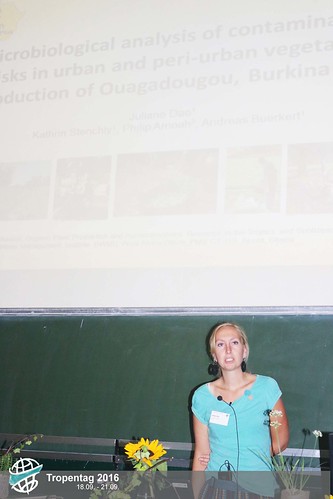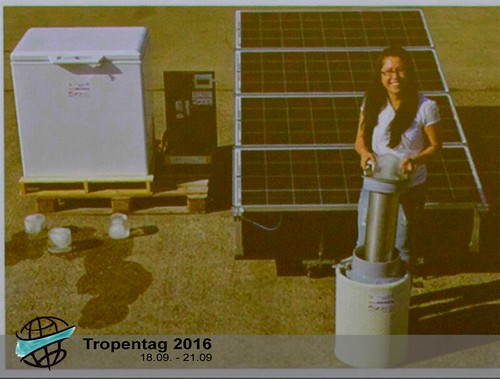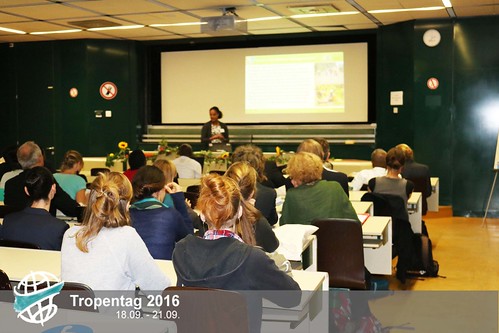Tropentag 2016
Tropentag Work Package 4 (WP4): Implementation
Wed, 09/21/2016 - 09:57 — BergerTropentag is a scientific conference - surely. Yet each serious research project has a work package dealing with implementation (because funders know it´s good for publicity) - so has Tropentag.
Solidarity in a competing world - a theme directly put into practice at the conference dinner on Tuesday night.
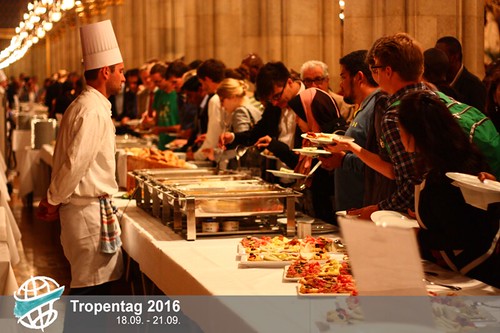
In a role game, participants could emotionally experience competition for limited resources. Solidarity developed - at least amongst the most marginalized at the very end of queues sharing the last bits of food. Meanwhile, waiters were emptying half empty plates into the darkness of Vienna´s sewage system.
But - let´s not forget: this conference is not only about solidarity. It´s also about fair use of resources. But what´s fair, anyway? Yet again: food proved to be the most hands-on- area of implementation. The following images of the Tropentag lunch will not need any further comment.
From the eyes of a small-scale milk trader: how to improve the milk value chain?
Wed, 09/21/2016 - 09:48 — PoscherYou are facing quite lots of difficulties, and if the quality of the milk is bad, you cannot sell it anymore. You bear the risks, you lose money if the milk gets bad. Controlling the product by smell, taste, texture and density without technical support needs much expertise.
Traveling to the producers, controlling and keeping the quality to resell to milk stations is certainly a hard job. So, how to improve the situation?
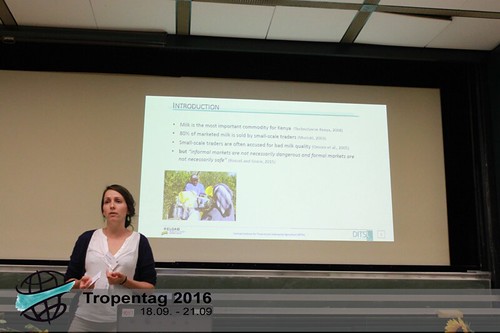 The presented research takes a closer look at those limitations and possibilities for improving the situation of small-scale milk trading from the perspective of a local milk trader. What are the results?
The presented research takes a closer look at those limitations and possibilities for improving the situation of small-scale milk trading from the perspective of a local milk trader. What are the results?
BMBF promote Research for development-innovative partnership
Wed, 09/21/2016 - 09:23 — Kootlole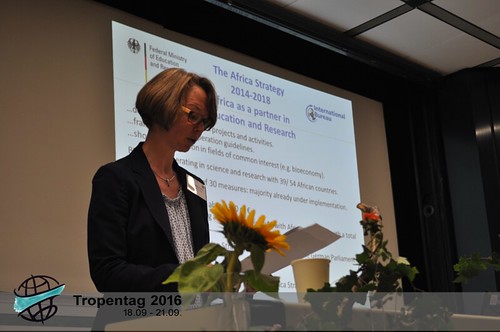 As some BMBF representative reported, the Ministry has a fund of 350 millions euros to be allocated by 2019. In 2016, they have funded about 300 projects together with African partners with a total budget of about 60 million euros, promoting the research in the area of health and medicine and climate change, energy and food production.
As some BMBF representative reported, the Ministry has a fund of 350 millions euros to be allocated by 2019. In 2016, they have funded about 300 projects together with African partners with a total budget of about 60 million euros, promoting the research in the area of health and medicine and climate change, energy and food production. A Very Warm Welcome at the Conference Dinner
Wed, 09/21/2016 - 00:23 — Fadli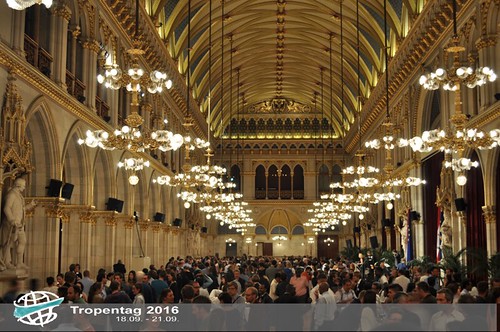
The second day of this year's conference just ended. It has been closed by the conference dinner at Vienna's historic City Hall: the perfect venue to feel the warm welcome from Tropentag. A traditional Viennese music ensemble, some delicious food, and an amazing location seem the be just a perfect combination to wrap up the intense day.

Indeed, I personally enjoyed when some participants took over the stage and performed their traditional dance. The others banqueters apparently had my same feeling as they clapped and joined the dance. Five people also got to receive the Ecoland Poster Award and a prize of 300 € each as the best Tropentag's posters. I hope you had a wonderful night too. But still, remember to spare some energy for the closing day tomorrow!
You can find more pictures of the dinner on our Flickr.Climate Change and Our Beloved Fruit Trees
Tue, 09/20/2016 - 18:42 — ElsbyA concerning fact that stood out during the presentation on lettuce contamination in Burkina Faso along the value chain was that 70% of the water being assessed in the study was above the safety or “health based target” threshold as set out by the World Health Organization. This water is being used to irrigate crops in urban and peri-urban locations, and is often derived from sewage contaminated sources.
Lettuce is an important crop in this area as it is considered “exotic” and has high value, especially during wedding season and other important occasions. Conserving its hygiene along the value chain is critical in preventing the food-borne illnesses that are all too frequent when using coliform-polluted water as an irrigation source.
Science and Practice – A Complex Relationship
Tue, 09/20/2016 - 17:30 — LangIn this year’s GIZ/EZ session, the linkages and the connectivity between research and development was discussed. How much research is necessary, and what type of knowledge and partnerships are needed to reach the final beneficiaries? - was the main question that arose their symposium.
Milk + Sun + Development = cooler, healthier milk? Local, solar-powered milk cooling
Tue, 09/20/2016 - 16:12 — Poscher
How does it work: The solar-powered energy is stored, transferred to a refrigerator and then used to produce ice. The ice then is put into a special designed milk container without having direct contact with the milk. By that, it cools down the milk through additional isolation to around 20 degrees over a long period.
"Being a Woman Farmer is Like Being Cursed"
Tue, 09/20/2016 - 16:01 — ElsbyThe opening oral presentation in the gender section this afternoon, Tuesday 20th, offered a bold statement: “being a woman farmer is like being cursed”. As a woman, and a farmer (albeit in a developed country), this topic especially intrigued me.
The main message from this session was that women in the global south are often inadvertently overburdened by work and life tasks as a result of well-intended gender equality policies. I think this rings true for women worldwide, in different ways.
A commenter from the audience recalled seeing women being given toasters and other small appliances as Mother’s Day and birthday gifts. And while these appliances made domestic life easier, it created more pressure and expectations for women to become gastronomical chefs. It seems that so many well-intended inventions and “advancements” have the unwanted result of making women’s lives more difficult.





